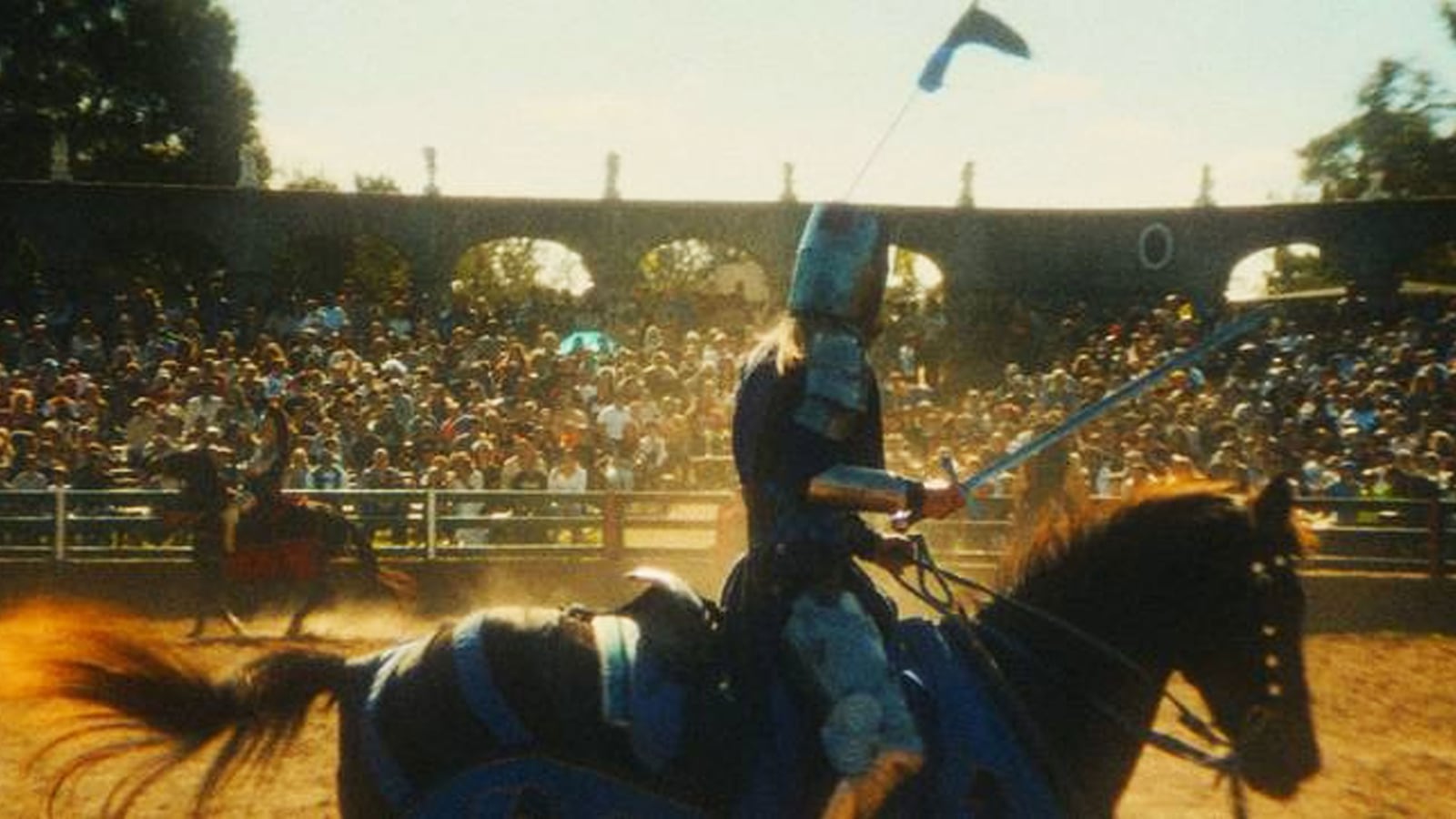A real-life Willy Wonka saga that occasionally veers into King Lear-by-way-of-Game of Thrones territory, Ren Faire is another in a long line of docuseries about wildly strange subcultures and their eccentric, cutthroat, and self-destructive inhabitants. In this case, that milieu is the Texas Renaissance Festival, the country’s largest such event, which takes place each October and November in Todd Mission, Texas.
As director Lance Oppenheim’s three-part documentary lays out, both the theme park and its surrounding town were created by George Coulam, who’s known throughout his fiefdom as King George. An 86-year-old tyrant who rules with an iron fist, suffers no one lightly, and is on the hunt for a successor—as well as a much younger wife who boasts no silicon enhancements—King George is as unique and fantastical as the world he’s built, and he proves to be the fascinating (and ultimately detestable) axis around which this colorful tale revolves.

Ren Faire (June 2, on HBO) takes place over the course of the Texas Renaissance Festival’s 2021 and 2022 seasons, with the elderly King George overseeing his massive operation from his absurdly gilded rococo-decorated house. Despite having once been married, King George lives alone, and is also lonely. Thus, when he’s not being a domineering jerk in meetings with his underlings, who wait on him hand and foot and appear to live in perpetual fear of his fickle wrath, he’s having his assistant manage his multiple dating site accounts. Those include one for women looking for sugar daddies, and on the first of two Olive Garden dinners depicted in the series, he greets his 25-year-old date by immediately asking her, “Are those your natural breasts?” As it turns out, they are, which means their meal continues. A subsequent date’s admission that she’s had cosmetic surgery, on the other hand, puts an immediate end to their meet-up, with King George bluntly announcing, “OK, we’re done.”
King George talks about how he wants to finally find love and settle down for a normal life filled with copious sex, since his goal is to die with an erection (something he claims is achievable with Viagra, Cialis, and weekly testosterone shots). Given this fixation on his phallus, it’s no surprise that King George fancies himself the cock of the walk, and despite his age and his confession that he’s made a few bad mistakes over the years, he embraces his status as an irreproachable monarch whose word and wishes are law. Initially inspired by his employment at a San Francisco renaissance fair, George opted to invent a grand one of his own. Taking his cue from Walt Disney, he soon purchased the surrounding land and established a literal town which he could control as mayor, thereby granting himself unfettered ability to realize his every outlandish medieval dream.
Ren Faire is, first and foremost, a character study, and its greatest strength is its access to its main subject, who’s revealed to be an authoritarian whose alienation is of his own making; commentary from his ex-wife, ex-best friends, and various coworkers make clear that his current solitary existence is due to his selfishness and callousness. King George provides first-hand evidence of those traits throughout the docuseries, snapping at employees with condescending rudeness whenever he doesn’t receive the precise (positive) answer he wants. People at the Texas Renaissance Festival don’t work for King George so much as serve him, and that dynamic is central to the show’s drama about his efforts to sell the festival and retire in the lap of luxury—a mission that entails choosing an heir from one of the individuals with eyes on his throne.

The two main contenders for that position are Jeff Baldwin and Louie Migliaccio, the former a jovial former entertainment director who’s now the general manager, and the latter an ambitious, energy drink-guzzling entrepreneur who built his own mini-empire within the festival via his kettle corn business. Neither man thinks the other is suited to wear the crown and both have different ways of seeking their ends, with Jeff sucking up to King George at every available opportunity (to the point of siding with the boss when he decides to demote Jeff’s wife Brandi) and Louie aggressively pursuing a purchase that would make him head honcho. Added to this combustible mix is Darla Smith, the vendor coordinator, who’s eventually promoted to co-general manager, and yet whose standing is—like everyone else at the festival—never fully secure thanks to King George’s mad impulsiveness.
Director Oppenheim paints vivid portraits of these individuals and their intertwined psychodramas, and he embellishes his action by mixing verité material with scenes in which they deliver expository lines or speak to imaginary figures (like a performer dressed as a dragon). Considering that the Texas Renaissance Festival is all about 16th-century fantasy, this blend of the real and unreal suits the proceedings, although it never quite results in formally daring electricity. When it’s not spending time in the company of King George, Ren Faire is a bit too staid, and that impression is exacerbated by the fact that it concentrates on its protagonists at the expense of imparting a real, lived-in sense of the festival itself. For all the snapshots of games, booths, and costumed visitors, the actual event—and its appeal for millions of annual customers—remains a relatively distant concept, better understood than felt.

Oppenheim is so taken with his nominal subjects that he loses sight of the environment that should be his other main character. Consequently, his series is engaging without being truly immersive. What it builds to, in the end, is merely a collection of attempts by King George to first cash in on his brainchild, and then to blow up those deals because, as is apparent to everyone, the Texas Renaissance Festival is all he truly has. “What is a king without his kingdom? He’s nothing,” surmises the tycoon. Yet by prioritizing the emperor over his sprawling, magnificent province—its long history; its myriad residents; its numerous nooks and crannies—Ren Faire comes across as half the story.






